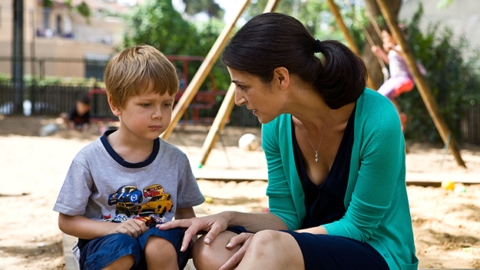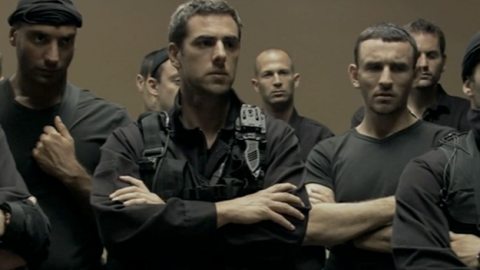Film of the Week: The Kindergarten Teacher
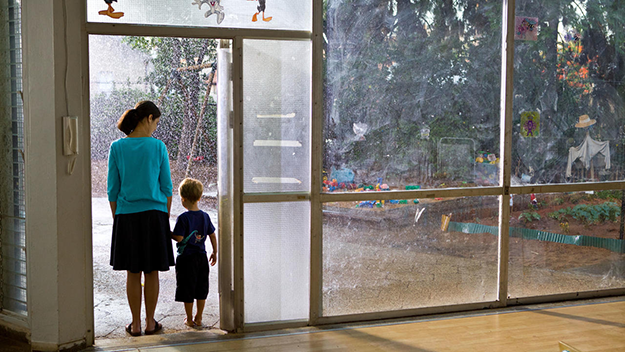
Israeli drama The Kindergarten Teacher is a deeply strange film—with the emphasis on “deeply.” Even in these cautious days, there’s no shortage of strangeness in cinema, but it usually comes in the more demonstrative, immediately recognizable variety—the flamboyance of a Paolo Sorrentino, say, or the skewed linguistic conceptualism of a Yorgos Lanthimos… We’re used to seeing strangeness that’s manifest, located right on the surface of a filmmaker’s visual language. But to call a film deeply strange would imply something more elusive that can’t easily be pinned down and explained—something that, even once you’ve got to grips with a film’s apparent meaning, still escapes you, causes you that itch you get from a riddle that remains partially unsolved.
Nadav Lapid’s film is just such a case. The synopsis doesn’t suggest anything very outré. It’s an ostensibly realistic story. A kindergarten teacher in contemporary Tel Aviv discovers that one of her pupils, a 5-year-old boy, is spontaneously coming up with precocious poems; starting out intrigued by him and what he seems to represent, she becomes disturbingly obsessed. It’s easy to imagine reading Lapid’s script for this film and envisioning something quite routine: a solid psychological drama with an element of debate on the meaning and value of art in contemporary culture. And it would be easy to imagine a prospective funder asking Lapid what style he imagined best suiting this material—undemonstrative naturalism, or something more stylized. Putting it that way, you see the problem of regarding a film and its script as two distinct commodities: you end up conceiving of directorial style as something simply applied to written material, as if slapped on top of it. But that is to ignore the troublesome relationship between script and finished film, and the way in which, as we watch, we are more likely to sense style as something coming before script, as if our awareness of a film’s subject or argument emerged out of its style as much as (or more than) out of the concrete evidence of its words or images.
It was certainly the slippery style of The Kindergarten Teacher that had me hooked from the outset, even before we know what the film’s about. At the very start, a man is watching an uproarious chat show on TV; the man is seen first just as a disembodied foot, then as a bald head, and as he moves his arm on the back of his sofa, his elbow twice nudges the camera, which visibly jolts—before it tracks over to follow his wife, the film’s protagonist, into the next room. All through the film, the camera moves in similarly strange ways. It drifts, it hovers at unconventional heights, it follows unexpected characters in circles, pans to and fro, tilts up and down. We’re not simply aware in this film (shot by Shai Goldman) of certain viewing positions, or even of the presence of the camera in a more or less concrete sense. Plenty of films make us hyperconscious of the camera’s movements, but in The Kindergarten Teacher, we become unusually conscious of someone physically moving the camera, probably because those moves are not obviously motivated. You sense an extra presence hovering around the action—literally, the camera operator, but figuratively, what kind of uninvited guest is a matter for the viewer’s imagination.
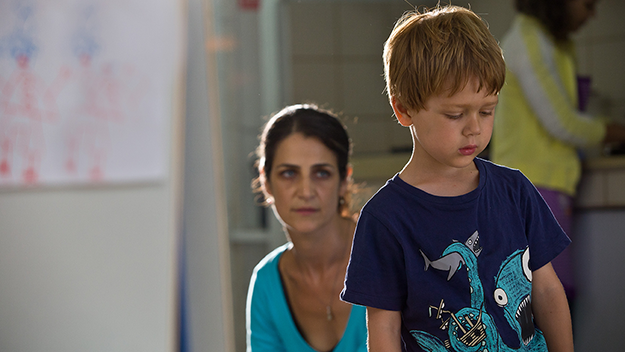
It’s hard to explain exactly what’s going on with the camera in this film—if it were, The Kindergarten Teacher wouldn’t be quite so alluringly odd—but it’s to do with point of view. That may sound obvious, but the film dramatizes this idea very consistently. The first poem that little Yoav (Avi Shnaidman) comes up with appears to be a brief love verse, addressed to a radiant female named Hagar. Depending who subsequently quotes the poem, or claims to have written it—the film is very much about appropriating the words of others—“Hagar” comes to signify someone or something different. The poem becomes a banal love ode, or the boy’s moving invocation of his absent mother, or a woman’s declaration of lesbian passion. When Yoav’s teacher Nira (Sarit Larry) reads the piece as her own at a poetry group, it causes a stir: one woman objects that it’s “cold, scientific, conceptual.”
It’s all to do with point of view—literally so. In one scene, Nira gives Yoav a lesson on this very question: taking him into the kindergarten yard, she asks him to consider “the yard through the eyes of an adult . . . the yard from the height of a cat.” The camera scans the yard accordingly—but to all intents and purposes, we’re just simply seeing it through the lens of a camera. What we make of it—poetic or otherwise—is up to us.
On an immediate level, the film is a commentary on what we do with other people’s words when we quote them—and in so doing, deform them, customizing them to our own requirements. (Every film critic knows this danger: we all come back from festivals enthusing about some film we’ve discovered—almost as if we’d actually made it ourselves.) At one point, Nira prepares Yoaz to read his poems at a public event, priming him with her answers to the questions he’s likely to be asked. Of course, the event is chaos, one woman instantly commandeering the boy’s words and delivering them in her own arm-waving, poetry-slam style.
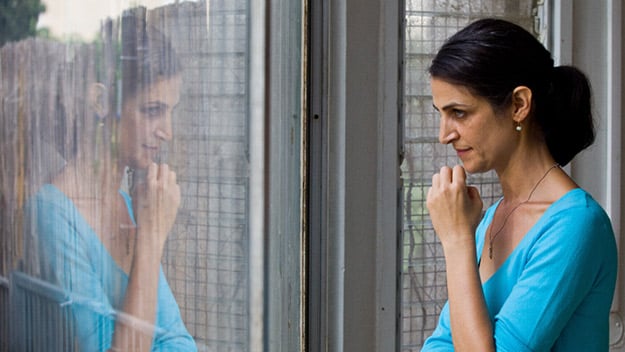
I take there to be a certain amount of specific satire about Israeli society and a culture of silencing certain voices: Yoaz’s gentle, seemingly innocuous poems face furious objections in the poetry group on every ground imaginable. When Nira reads his lines about a bullfighter, one woman erupts: the very idea of bullfighting is utterly immoral. It might be a stretch to regard The Kindergarten Teacher as a political film as such—but then, it’s hard to imagine any films emerging from Israel today as not being political, especially if they appear not to be. The very fact that there is no overt reference to Israel’s current conflict—apart from a scene in which Nira’s son hosts a party for fellow soldiers—and the invisibility of any Palestinian presence either in the characters or as a theme are themselves surely significant. Lapid depicts a world that seems to have conflict and aggression built into it at every level: early on, Yoaz and a little playmate sing a very adult chant directed at a rival football club to the one they support, and the violence is startling: “Maccabee Football Club are Nazis . . . I hate you with all my heart.” The members of the poetry group seem to be eternally poised for war, to shut each other down. And, teaching Yoaz how to tell Ashkenazi from Sephardi Jews on the beach (she is the latter, her husband the former), Nira is giving the boy a primer on distinctions, a first step in seeing the world as an us-and-them affair.
While the film seems to mount a passionate defense of poetry in a world that rejects it, Nira’s attachment to a cult of language seems a violent rejection of reality. She’s a militant aesthete just as people around her are militant anti-aesthetes. Yoaz’s father Amnon (Yehezkel Lazarov) is a restaurateur who doesn’t give a damn about poetry, and doesn’t want his son to waste his life on it; after all, Amnon’s brother is a poet, and that pursuit got him nowhere. Yoaz, pleads Nira, is a Mozart-like genius, “a poet in a world that hates poets.” But maybe she’s overstating her point, aggressively radicalizing her cause: the more painful truth is that we live in a world that’s simply indifferent to poets. The Kindergarten Teacher is about a world in which poetry is of absolute value to a few, while considered useless by most (again, we film critics can wring our hands relating to that, as we think about our favorite minority-interest movies).
While all these themes buzz through the film, The Kindergarten Teacher remains enigmatic, never quite reducible to the overt themes that buzz through it. The strangeness is there in the camera movements, but also in Sarit Larry’s unsettling, brittle performance, sometimes tender and vulnerable, sometimes troublingly seductive, always with a steely undertone that makes it easy to assume that Nira is mad—yet you can’t ever quite reduce her disturbance to a mental condition. The strangeness is there too in odd sound touches: a crucial discussion between Nira and Amnon is played out, distractingly, to a Chet Baker number which Amnon makes a point of putting on, as if to drown out thought. And it’s there in abrupt, explosive bursts of action: an incongruously frenetic dance moment at a club, the wildly demonstrative eruptions of the female slam poet.
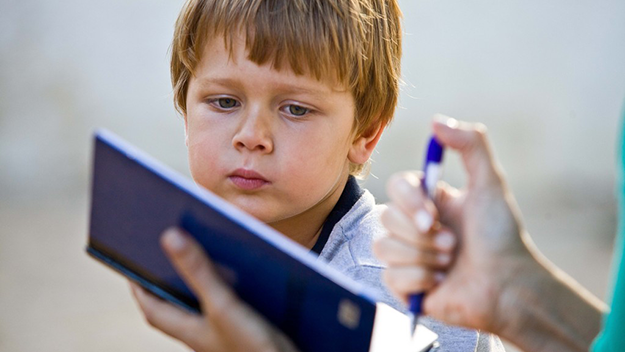
All of this makes it that much harder to decide what The Kindergarten Teacher means—but you certainly know how it feels, and how deeply strange it feels. At one point, there’s a reference to André Breton on the subject of dreaming: before going to bed at night, he would put up a sign reading, “Do not disturb. Poet at work.” But Breton also said: “Beauty will be convulsive, or not at all.” And it’s the convulsiveness of Lapid’s film that makes it beautiful, and beautifully perplexing.



